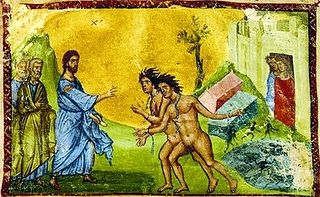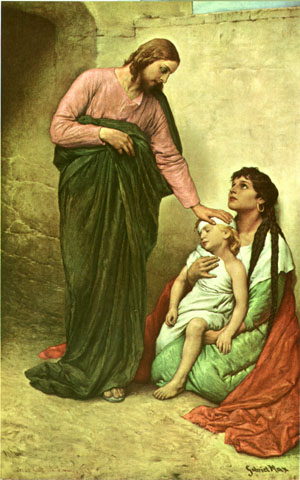January 15, 2014
Wednesday of the First Week in Ordinary Time
During the time young Samuel was minister to the LORD under Eli,
a revelation of the LORD was uncommon and vision infrequent.
One day Eli was asleep in his usual place.
His eyes had lately grown so weak that he could not see.
The lamp of God was not yet extinguished,
and Samuel was sleeping in the temple of the LORD
where the ark of God was.
The LORD called to Samuel, who answered, “Here I am.”
Samuel ran to Eli and said, “Here I am. You called me.”
“I did not call you,” Eli said. “Go back to sleep.”
So he went back to sleep.
Again the LORD called Samuel, who rose and went to Eli.
“Here I am,” he said. “You called me.”
But Eli answered, “I did not call you, my son. Go back to sleep.”
At that time Samuel was not familiar with the LORD,
because the LORD had not revealed anything to him as yet.
The LORD called Samuel again, for the third time.
Getting up and going to Eli, he said, “Here I am.
You called me.”
Then Eli understood that the LORD was calling the youth.
So Eli said to Samuel, “Go to sleep, and if you are called, reply,
‘Speak, LORD, for your servant is listening.’”
When Samuel went to sleep in his place,
the LORD came and revealed his presence,
calling out as before, “Samuel, Samuel!”
Samuel answered, “Speak, for your servant is listening.”
Samuel grew up, and the LORD was with him,
not permitting any word of his to be without effect.
Thus all Israel from Dan to Beersheba
came to know that Samuel was an accredited prophet of the LORD.
R. (8a and 9a) Here am I, Lord; I come to do your will.
I have waited, waited for the LORD,
and he stooped toward me and heard my cry.
Blessed the man who makes the LORD his trust;
who turns not to idolatry
or to those who stray after falsehood.
R. Here am I, Lord; I come to do your will.
Sacrifice or oblation you wished not,
but ears open to obedience you gave me.
Burnt offerings or sin-offerings you sought not;
then said I, “Behold I come.”
R. Here am I, Lord; I come to do your will.
“In the written scroll it is prescribed for me.
To do your will, O my God, is my delight,
and your law is within my heart!”
R. Here am I, Lord; I come to do your will.
I announced your justice in the vast assembly;
I did not restrain my lips, as you, O LORD, know.
R. Here am I, Lord; I come to do your will.
On leaving the synagogue
Jesus entered the house of Simon and Andrew with James and John.
Simon’s mother-in-law lay sick with a fever.
They immediately told him about her.
He approached, grasped her hand, and helped her up.
Then the fever left her and she waited on them.
When it was evening, after sunset,
they brought to him all who were ill or possessed by demons.
The whole town was gathered at the door.
He cured many who were sick with various diseases,
and he drove out many demons,
not permitting them to speak because they knew him.
Rising very early before dawn,
he left and went off to a deserted place, where he prayed.
Simon and those who were with him pursued him
and on finding him said, “Everyone is looking for you.”
He told them, “Let us go on to the nearby villages
that I may preach there also.
For this purpose have I come.”
So he went into their synagogues, preaching and driving out demons
throughout the whole of Galilee.
Catholic Culture

Collect: Attend to the pleas of your people with heavenly care, O Lord, we pray, that they may see what must be done and gain strength to do what they have seen. Through our Lord Jesus Christ, your Son, who lives and reigns with you in the unity of the Holy Spirit, one God, for ever and ever.
o Date and Nut Bread
o Whole Wheat Bread
o How God Provides
o On Parental Duty and How Parents Let Their Children Risk Chastity
o Story of St. Paul the Hermit
o Blessing of Saint Maurus over the Sick
o Prayer for Those Suffering Despair
o Litany of Saint Maurus
o Litany of Our Lady of Prompt Succor
o Bl. Claude La Colombiere: A Priest after Christ's Heart | Rev. Walter Kern
· Ordinary Time: January 15th
· Wednesday of the First Week of Ordinary Time
Old Calendar: St. Paul, confessor, the first Hermit; St. Maurus, abbot; St. Claude de la Colombiere, religious; Our Lady of Prompt Succor
It was from St. Jerome (+ 420) that the west learned of the life of St. Paul; the book, which he devoted to the life of the first Christian hermit, charmed and instructed generations of the faithful and formed the inspiration of many artists. St. Paul is said to have died in 341, in a hermitage in the region of Thebes in Egypt after having received at the age of 113 a visit from St. Antony.
St. Maurus was one of the first disciples of St. Benedict. In this son of a patrician Roman family, entrusted by his parents to the father of western monasticism, Benedictine tradition celebrates the perfect monk, and the model of childlike obedience. Many monasteries, particularly in France, adopted him as patron. He died about A.D. 580.
The Jesuit Priest St. Claude de la Colombière was the first to believe in the mystical revelations of the Sacred Heart given to St. Margaret Mary in Paray le Monial Convent, France. Thanks to his support, St. Margaret Mary’s superior also believed, and propagation of the devotion to the Sacred heart was started.
In some places today is the feast of Our Lady of Prompt Succor, Patroness of the State of Louisiana.
St. Paul, the first hermit
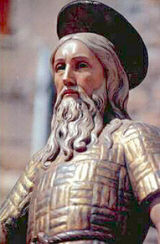
St. Paul is called "the first hermit" in the Missal and Breviary, a rare distinction, for such titles are seldom appended. Our saint was the standard-bearer of those courageous men who for the love of Christ left the world and entered the wilderness to dedicate themselves wholly to contemplation amid all the privations of desert life. The hermits were the great men of prayer in those difficult times when the Church was locked in fierce struggle with heresy after heresy. For centuries the example of their lives served as the school of Christian perfection. Their action set the background for the rise of monasticism and religious orders in the Church.
The Breviary retains an edifying legend concerning today's saint. One day St. Anthony, then ninety, was divinely inspired to visit the hermit Paul. Though they had never met previously, each greeted the other correctly by name. While they were conversing at length on spiritual matters, the raven that had always brought Paul half a loaf of bread, came with a whole loaf. As the raven flew away, Paul said: "See, the Lord, who is truly good and merciful, has sent us food. Every day for sixty years I have received half a loaf, but with your arrival Christ sent His servants a double ration." Giving thanks, they ate by a spring.
After a brief rest, they again gave thanks, as was their custom, and spent the whole night praising God. At daybreak Paul informed Anthony of his approaching death and asked him to fetch the cloak he had received from St. Athanasius, that he might wrap himself in it. Later, as Anthony was returning from his visit, he saw Paul's soul ascending to heaven escorted by choirs of angels and surrounded by prophets and apostles. Further traditional matter may be found in The Life of Paul the Hermit, written by St. Jerome about the year 376.
Patron: Clothing industry; weavers.
Symbols: Dead man whose grave is being dug by a lion; man being brought food by a bird; man clad in rough garments made of leaves or skins; old man, clothed with palm-leaves, and seated under a palm-tree, near which are a river and loaf of bread; with Saint Anthony the Abbot.
Things to Do:
- Bake a loaf of bread to celebrate this feast, as it is recounted in the Golden Legend how St. Paul received his daily bread every day from God.
- Read St. Jerome's account of the Life of St. Paul.
- The Order of St. Paul the Hermit (Paulines) runs the Shrine of Our Lady of Chestochowa in Doylestown, PA. Read more about the order and if in the neighborhood pay a visit (or a virtual visit) to the Shrine.
St. Maurus
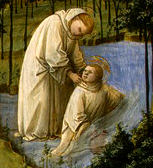
In Benedictine history Maurus holds a distinguished place, taught and trained by St. Benedict himself. While still very young, Maurus and another youth, Placid, were brought by their parents to be reared in monastic life by the Patriarch of Monks. An incident reveals Maurus' spirit of childlike obedience. One day Placid was sent to a near-by lake to draw water. Soon he was at the shore, where, boy that he was, he fell victim to his own heedlessness. Eager to fill the vessel quickly, he reached out too far and was dragged in by the rapidly filling jar. He was being borne along by the waves when from his cell St. Benedict realized what had happened. "Hurry, run to the lake! Placid has fallen in!" he called to Maurus. Stopping only for his spiritual father's blessing, Maurus sped to the lake, seized Placid by the hair and brought him ashore.
Imagine his shock and amazement when he realized that he had run some distance on water! His explanation? Such a miracle could not have happened save by virtue of his master's command! St. Gregory relates the incident in his Second Book of Dialogues along with much other interesting detail from the life of St. Benedict. The Martyrology makes this comment on the miracle: How greatly he advanced in faith under his teacher (St. Benedict) is attested by an occurrence unheard of since the days of St. Peter; for, on one occasion he walked upon water as though it were dry land. The tradition that Maurus later became abbot at Glanfeuil in France lacks historical support.
Patron: Against cold; against gout; against hoarseness; charcoal burners; cobblers; cold; coppersmiths; gout; hoarseness; shoemakers.
Symbols: Monk saving Saint Placid from drowning while a cowl floats above him; abbot with crozier; abbot with book and censer; holding the weights and measures of food and drink given him by Saint Benedict.
St. Claude de la Colombière
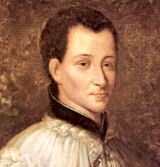
Missionary and ascetical writer, born of noble parentage at Saint-Symphorien-d'Ozon, between Lyons and Vienne, in 1641; died at Paray-le-Monial, 15 February, 1682. He entered the Society of Jesus in 1659. After fifteen years of religious life he made a vow, as a means of attaining the utmost possible perfection, to observe faithfully the rule and constitutions of his order under penalty of sin. Those who lived with him attested that this vow was kept with great exactitude. In 1674 Father de la Colombière was made superior at the Jesuit house at Paray-le-Monial, where he became the spiritual director of Blessed Margaret Mary and was thereafter a zealous apostle of the devotion to the Sacred Heart of Jesus. In 1676 he was sent to England as preacher to the Duchess of York, afterwards Queen of Great Britain. He lived the life of a religious even in the Court of St. James and was as active a missionary in England as he had been in France. Although encountering many difficulties, he was able to guide Blessed Margaret Mary by letter. His zeal soon weakened his vitality and a throat and lung trouble seemed to threaten his work as a preacher. While awaiting his recall to France he was suddenly arrested and thrown into prison, denounced as a conspirator. Thanks to his title of preacher to the Duchess of York and to the protection of Louis XIV, whose subject he was, he escaped death but was condemned to exile (1679). The last two years of his life were spent at Lyons where he was spiritual director to the young Jesuits, and at Paray-le-Monial, whither he repaired for his health. His principal works, including "Pious Reflections", "Meditations on the Passion", "Retreat and Spiritual Letters", were published under the title, "Oeuvres du R. P. Claude de la Colombière" (Avignon, 1832; Paris, 1864). His relics are preserved in the monastery of the Visitation nuns at Paray-le-Monial. (Catholic Encyclopedia) He was canonized by Pope John Paul II on May 31, 1992.
Patron: Toy makers; turners.
Things to Do:
Our Lady of Prompt Succor
Devotion to Our Lady of Prompt Succor dates back to 1802, when the Ursuline Order in New Orleans pleaded for help in sustaining the Order with new sisters from France. Their prayers were answered with papal permission for sisters to be transferred from France to New Orleans. In thanksgiving for this favor, the Ursulines dedicated a statue in their convent chapel to Our Lady of Prompt Succor in 1810.
In 1812, a terrible fire broke out in New Orleans, and the wind was blowing the flames toward the convent. Prayers before the statue of Our Lady were answered with a reversal of the wind direction and the convent was spared.
During the Battle of New Orleans, in 1815, the sisters again invoked the assistance of Our Lady of Prompt Succor. As the sound of guns and cannons thundered around the chapel during Mass, they vowed to have a Mass of Thanksgiving sung every year if the Americans were victorious. At Communion time, a messenger arrived with the news that Gen. Andrew Jackson's overmatched army had successfully driven the British from the city. Once again Our Lady had responded promptly.
In 1928, the Holy See approved the selection of Our Lady of Prompt Succor as the Patroness of the city of New Orleans and the state of Louisiana. The Mass of Thanksgiving is offered each January 8 at the Shrine of Our Lady of Prompt Succor in New Orleans.
Patron: State of Louisiana; the Archdiocese of New Orleans; City of New Orleans
Things to Do:
29. And forthwith, when they were come out of the synagogue, they entered into the house of Simon and Andrew, with James and John.
30. But Simon's wife's mother lay sick of a fever, and immediately they tell him of her.
31. And he came and took her by the hand, and lifted her up; and immediately the fever left her, and she ministered to them.
BEDE; First, it was right that the serpent's tongue should be shut up, that it might not spread any more venom; then that the woman, who was first seduced, should he healed from the fever of carnal concupiscence. Wherefore it is said, And forthwith, when they were come out of the synagogue, &c.
THEOPHYL. He retired then as the custom was on the sabbath-day about evening to eat in His disciples' house. But she who ought to have ministered was prevented by a fever. Wherefore it goes on, But Simon's wife's mother was lying sick with a fever.
PSEUD-CHRYS. But the disciples, knowing that they were to receive a benefit by that means, without waiting for the evening prayed that Peter's mother should be healed. Wherefore there follows, who immediately tell him of her.
BEDE; But in the Gospel of Luke it is written, that they besought him for her. For the Savior sometimes after being asked, sometimes of His own accord, heals the sick, showing that he always assents to the prayers of the faithful, when they pray also against had passions, and sometimes gives them to understand things which they do not understand at all, or else, when they pray unto Him dutifully, forgives their want of understanding; as the Psalmist begs of God, Cleanse me, O Lord, from my secret faults.
Wherefore He heals her at their request; for there follow, And he came and took her by the hand, and lifted her up.
THEOPHYL. By this it is signified, that God will heal a sick man, if he ministers to the Saints, through love to Christ.
BEDE; But in that He gives most profusely His gifts of healing and doctrine on the sabbath day, He teaches, that He is not under the Law, but above the Law, and does not choose the Jewish sabbath, but the true sabbath, and our rest is pleasing to the Lord, if, in order to attend to the health of our souls, we abstain from slavish work, that is, from all unlawful things. It goes on, and immediately the fever left her, &c. The health which is conferred at the command of the Lord, returns at once entire, accompanied with such strength, that she is able to minister to those, of whose help she had before stood in need. Again, if we suppose that the man delivered from the devil means, in the moral way of interpretation, the soul purged from unclean thoughts, fitly does the woman cured of a fever by the command of God mean the flesh, restrained from the heat of its concupiscence by die precepts of continence.
PSEUDO-JEROME; For the fever means intemperance, from which, we the sons of the synagogue, by the hand of discipline, and by the lifting up of our desires, are healed, and minister to the will of Him who heals us.
THEOPHYL. But he has a fever who is angry, and in the unruliness of his anger stretches forth his hands to do hurt; but if reason restrains his hands, he will arise, and so serve reason.
32. And at even, when the sun did set, they brought unto him all that were diseased, and them that were possessed with devils.
33. And all the city was gathered together at the door.
34. And he healed many that were sick of divers diseases, and cast out many devils; and suffered not the devils to speak, because they knew him.
THEOPHYL. Because the multitude thought that it was not lawful to heal on the sabbath day, they waited for the evening, to bring those who were to be healed to Jesus. Wherefore it is said, And at even, when the sun had set. There follows, and he healed many that were vexed with divers diseases.
PSEUD-CHRYS. Now in that he says many, all are to be understood according to the Scripture mode of expression.
THEOPHYL. Or he says many, because there were some faithless persons, who could not at all be cured on account of their unfaithfulness. Therefore He healed many of those who were brought, that is, all who had faith. It goes on, and cast out many devils.
PSEUDO-AUG. For the devils knew that He was the Christ, who had been promised by the Law: for they saw in Him all the signs, which had been foretold by the Prophets; but they were ignorant of His divinity, as also were their princes, for if they had known it, they would not have crucified the Lord of glory.
BEDE; For, Him whom the devil had known as a man, wearied by His forty days' fast, without being able by tempting Him to prove whether He was the Son of God, he now by the power of His miracles understood or rather suspected to be the Son of God. The reason therefore why he persuaded the Jews to crucify Him, was not because he did not think that He was the Son of God, but because he did not foresee that he himself was to be condemned by Christ's death.
THEOPHYL. Furthermore, the reason that He forbade the devils to speak, was to teach us not to believe them, even if they say true. For if once they find persons to believe them, they mingle truth with falsehood.
PSEUDO-CHRYS. And Luke does not contradict this, when he says, that devils came out of many, crying out, and saying, You are Christ the Son of God: for he subjoins, And he rebuking them, suffered them not to speak; for Mark, who passes over many things for the sake of brevity, speaks about what happened subsequently to the above-mentioned words.
BEDE; Again, in a mystical sense, the setting of the sun signifies the passion of Him, who said, As long as I am in the world, I am the light of the world. And when the sun was going down, more demoniacs and sick persons were healed than before: because He who living in the flesh for a time taught a few Jews, has transmitted the gifts of faith and health to all the Gentiles throughout the world.
PSEUDO-JEROME; But the door of the kingdom, morally, is repentance and faith, which works health for various diseases; for divers are the vices, with which the city of this world is sick.
35. And in the morning, rising up a great while before day, he went out, and departed into a solitary place, and there prayed.
36. And Simon and they that were with him followed after him.
37. And when they had found him, they said unto him, All men seek for thee.
38. And he said unto them, Let us go into the next towns, that I may preach there also: for therefore came I forth.
39. And he preached in their synagogues throughout all Galilee, and cast out devils.
THEOPHYL. After that the Lord had cured the sick, He retired apart. Wherefore it is said, And rising very early in the morning, he went out and departed into a desert place. By which He taught us not to do any thing for the sake of appearance, but if we do any good, not to publish it openly. He goes on, and there prayed.
PSEUD-CHRYS. Not that He required prayer; for it was He who Himself received the prayers of men; but He did this by way of an economy, and became to us the model of good works.
THEOPHYL. For He shows to us that we ought to attribute to God whatever we do well, and to say to Him, Every good gift comes down from above, from Thee. He continues: And Simon followed him, and they that were with him.
PSEUD-CHRYS. Luke however says, that crowds came to Christ, and spoke what Mark here relates that the Apostles said, adding, And when they came to him, they said to him, All seek you. But they do not contradict each other; for Christ received after the Apostles the multitude, breathlessly anxious to embrace His feet. He received them willingly, but chose to dismiss them, that the rest also might be partakers of His doctrine, as He was not to remain long in the world.
And therefore there follows: And he said, Let us go into the neighboring villages and towns, that there also I may preach.
THEOPHYL. For He passes on to them as being more in need, since it was not right to shut up doctrine in one place, but to throw out his rays every where. It goes on: For therefore am I come.
PSEUD-CHRYS. In which word, He manifests the mystery of His emptying himself, that is, of His incarnation, and the sovereignty of His divine nature, in that He here asserts, that He came willingly into the world. Luke however says, To this end was I sent, proclaiming the Dispensation, and the good pleasure of God the Father concerning the incarnation of the Son.
There follows: And he continued preaching in their synagogues, in all Galilee.
AUG. But by this preaching, which, he says, He continued in all Galilee, is also meant the sermon of the Lord delivered on the mount, which Matthew mentions, and Mark has entirely passed over, without giving any thing like it, save that he has repeated some sentences not in continuous order, but in scattered places, spoken by the Lord at other times.
THEOPHYL. He also mingled action with teaching, for whilst employed in preaching, He afterwards put to flight devils. For there follows: And casting out devils. For unless Christ showed forth miracles, His teaching would not be believed; so do thou also, after teaching, work, that your word be not fruitless in thyself.
BEDE; Again mystically if by the setting of the sun, the death of the Savior is intended, why should not His resurrection be intended by the returning dawn? For by its clear light, He went far into the wilderness of the Gentiles, and there continued praying in the person of His faithful disciples, for He aroused their hearts by the grace of the Holy Spirit to the virtue of prayer.
Catena Aurea Mark 1




